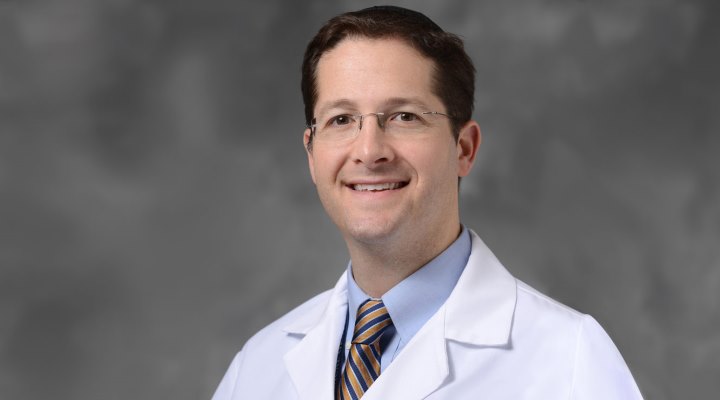Dr. Jeffrey Morgan is a cardiothoracic surgeon specializing in heart transplants and left ventricular assist devices (LVAD). Dr. Morgan graduated with his M.D. from Albert Einstein College of Medicine in 1999. From there he moved onto a surgical residency at Mt. Sinai. After completing a cardiothoracic surgical residency at NYU in 2007, he continued his education with an advanced fellowship at Columbia Presbyterian through 2008. There, he focused on heart transplantation and LVAD.
Upon graduation, Dr. Morgan was recruited to Henry Ford Hospital in Detroit where he was the Surgical Director of Mechanical Circulatory Support. Between 2008 and 2016, he led the specialty department to an increased volume of heart transplants and LVAD surgeries, increasing survival rates and lowering complication rates.
In 2016, Dr. Morgan joined the Texas Heart Institute and Baylor College of Medicine, where he led the Transplantation and Mechanical Circulatory teams. He is also a Professor of Surgery at the college.
Dr. Morgan spends his free time with his wife and four children and is continuously traveling to different scientific conferences for presentations on the newest medical research.
Why did you choose to become a doctor?
I wanted to help people. I wanted to make a difference in their lives. I wanted a career where I’d go to work each day knowing I’d be making a real impact.
Why did you choose this specialty?
Cardiothoracic surgery allows you to make a huge impact in a profound way. You get to help people live longer and better lives by improving their survival and quality of life. I treat my patients like they are my own family members. I develop close relationships with them.
This specialty is also great because it is very team-focused. I find that an excellent resource, especially in medicine. You need to have good communication with your surgical team and I thrive in this environment.
What is your daily routine?
I usually get to the hospital about 7 am and make rounds in the ICU until about 8. After that, I am usually in surgery until about 2. In the afternoon, I am generally meeting with patients in my office. Those are patients who have already had surgery, or we may be evaluating them for an upcoming procedure. I also have administrative meetings throughout the day relating to leadership and improving patient care.
When you look forward in your career, what trend do you see impacting your specialty the most and why?
I believe we are moving toward operations becoming more minimally invasive. We’ll be able to use smaller incisions, resulting in faster recovery.
There are also improvements to current technologies. For example, right now we have a battery that’s connected to the LVAD through the skin. With the new technology, that cord won’t be necessary anymore. Everything will be internal. Twenty-five to thirty percent of LVAD patients deal with infection due to this cord. Having it all internal will reduce the number of infections and improve patient quality of life.
What do you love about your job?
I love that I get to make a difference, that I get to help people in a time of despair. I get to present them with a path forward, beyond what they are struggling with. It’s all about improving the patient’s quality of life.
What is the greatest accomplishment in your career?
There isn’t just one, really. Each day has its own challenges, its own difficult surgeries and problems. There’s a lot of gratification that comes from successful outcomes.
One thing that I am very proud of is that we were able to establish a scientific meeting with experts in the field of mechanical circulatory support within the American Association of Thoracic Surgeons. We presented to the education committee and were approved for a standing meeting relating to heart failure, lung failure, and end-stage therapies. I believe this will bring more support and focus to the field and be very helpful for patients.
Can you please share some of your volunteer activities?
I volunteer for my synagogue, including leading services and administrative support. I’m also part of committees to help with the improvement of the synagogue.
What do you do to mentally separate yourself from your job?
My family helps with that. They need me to be there with them at the end of each day. Whether it’s been a great day or a challenging day, I try to come home with a fresh slate and open mind for listening to them about their days or helping them with homework.
I also like to use exercise as a way of separating work from personal time. Exercise is an excellent way to get the endorphins pumping and provide relaxation.
Where do you want to be in your career in the next 5 years?
I’d like to remain busy as a clinical heart surgeon, performing all types of heart surgery. I don’t just perform transplants and LVAD surgeries. There are also valve repairs and other general heart surgeries that I perform.
I would also like to be involved in research relating to heart failure and trying to move the field forward with new therapies.
Can you describe your style of patient care?
My style is to be very transparent and open with patients and to take the time to explain all the risks and benefits of all options. I want to make sure that my patients and their families have a crystal-clear understanding of all aspects of the care and to make sure all of their questions are answered. I think communication is extremely important and taking the time to spend with my patient and their family is tantamount to their comfort with the care we decide on.
What do you think the fundamental aspects are to heart health?
There are several important lifestyle decisions that critically impact heart healthiness, such as not smoking, regular exercise, weight loss, cholesterol control, getting enough sleep, and good dietary decisions.

